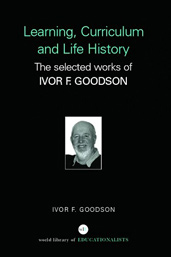Learning, Curriculum and Life Politics: the selected works of Ivor F. Goodson
Coming to Curriculum
These then were aspects of my world; but why did we never talk about them let alone learn about it at school?
My concerns about schooling increased when I went to secondary school. I passed the '11-plus' and was sent off to a grammar school (again, miles away from my village). All my friends now went to our village's school: a secondary modern. The long ride to the grammar school through the council estates wearing a blue 'Venetian' blazer and a hat with a yellow tassel cemented an incurable fascination with schooling. (The fascination lasted longer than the blazer and hat, which I took to packing in my bike saddle bag and putting on in the school's bike shed.)
At the grammar school the curriculum made my sense of dichotomy at the primary school seem churlish. Here, not only was the content alien and dull but the very form of transmission and structure (the discursive formation no less) utterly bewildering. I experienced schooling as one learning a second language. A major factor in this cultural displacement was the school's curriculum.
At the school I languished: taking nine 'O' level exams and failing eight. At fifteen I was at work in a crisp factory. Later however (through the intervention of one teacher) I returned to school and, though still burdened with a sense of alienation from the subject matter, began to perform the tests of rote learning and memory which were rewarded with exam passes.
A degree (in Economic History) and a period of doctoral work (Irish immigrants in Victorian England) followed but in 1968 the continuing sense of dichotomy between 'life' and 'study' led me to abandon all thought of an academic career. The starting points were two articles -one by Basil Bernstein in New Society, 'Open Schools, Open Society'; the other by Barry Sugarman on secondary school pupil cultures (British Journal of Sociology, 1967).
These articles showed me that there were modes of academic study where the everyday experiences of ordinary pupils and people might be investigated. In short, where my experience of life and my intellectual questions about that experience might be finally reconnected. But, just as before, I had had to abandon my intellectual interests to pass examinations; now once again, I had to abandon an academic career so that self and study might be reinvested with some degree of authenticity.
The decision to abandon my academic career was essentially a positive redirection. Once I had identified the kind of work epitomized in Bernstein and Sugarman, I saw the newly-organizing comprehensive schools as the place where I wanted to work. Here, my own class background and experience might engage with that of my pupils in a 'common language' of dialogue between teacher and taught. For the new generation of pupils from working homes there might be something beyond the pervasive alienation I had experienced at school.
